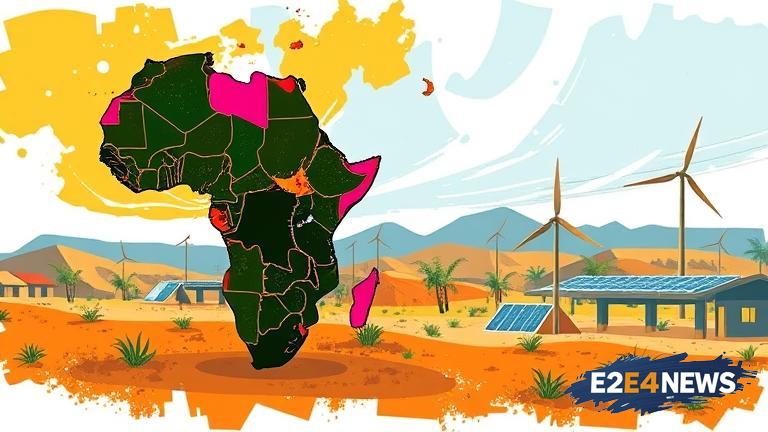The African continent is witnessing a significant shift towards renewable energy, driven by the need to address the pressing issues of energy access, climate change, and sustainable development. With many countries still struggling to provide reliable and affordable electricity to their citizens, renewable energy has emerged as a viable solution. Solar and wind power are becoming increasingly popular, with countries like South Africa, Egypt, and Morocco leading the charge. The cost of renewable energy technologies has decreased dramatically over the years, making them more competitive with fossil fuels. This has led to a surge in investment in the sector, with many international companies and organizations committing to support Africa’s renewable energy ambitions. The African Union’s Agenda 2063 has set a target of ensuring access to clean and affordable energy for all Africans by 2030. To achieve this goal, the continent will need to increase its renewable energy capacity significantly. Several countries have already made significant progress in this regard, with Kenya, for example, aiming to generate 70% of its electricity from renewable sources by 2030. Rwanda has also set an ambitious target of becoming a carbon-neutral economy by 2050. The use of renewable energy is not only good for the environment, but it also has numerous economic benefits. It can create jobs, stimulate local economies, and reduce dependence on imported fossil fuels. Furthermore, renewable energy can help to improve energy security, reduce the risk of price volatility, and enhance energy independence. However, despite the many benefits of renewable energy, there are still several challenges that need to be addressed. These include the lack of infrastructure, limited access to financing, and the need for policy and regulatory frameworks that support the development of the sector. To overcome these challenges, African countries will need to work together, share knowledge and expertise, and attract investment from international partners. The private sector also has a critical role to play in supporting the growth of renewable energy in Africa. Companies like Vestas, Siemens Gamesa, and Goldwind are already actively involved in the African market, providing technology and expertise to support the development of wind and solar farms. In addition to these efforts, there is also a need for greater investment in energy storage technologies, such as batteries, to ensure that renewable energy can be dispatched to the grid when it is needed most. The development of smart grids and other advanced technologies will also be critical to supporting the integration of renewable energy into the grid. As the demand for energy continues to grow in Africa, it is clear that renewable energy will play an increasingly important role in meeting this demand. With the right policies, investments, and technologies in place, Africa can unlock its vast renewable energy potential and create a more sustainable, prosperous, and climate-resilient future for all its citizens. The continent’s renewable energy revolution is gaining momentum, and it is an exciting time for Africa’s energy sector. As the world transitions to a low-carbon economy, Africa has the opportunity to leapfrog traditional fossil fuel-based development and embrace a cleaner, greener future. This will require continued investment, innovation, and cooperation, but the potential rewards are significant. By harnessing its renewable energy potential, Africa can reduce its dependence on imported fuels, improve energy security, and create new economic opportunities. The future of energy in Africa is renewable, and it is an exciting time to be a part of this journey.





